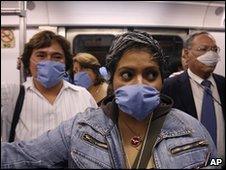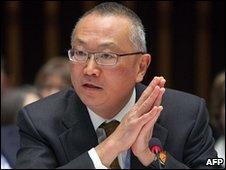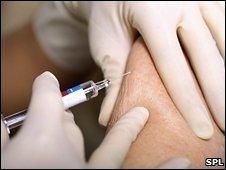WHO faces questions over swine flu policy
- Published

The virus was first recorded in Mexico in April 2009
As the 193 member states of the World Health Organization meet in Geneva, questions over the body's handling of the H1N1 swine flu pandemic are high on the agenda.
Some medical experts doubt whether this was really a pandemic at all.
For several years before swine flu first surfaced in Mexico in April 2009, WHO officials had been warning that a global influenza pandemic was simply a matter of time.
After major pandemics in 1918, 1957 and 1968, many flu experts believed another one was imminent. Though the recent H5N1 bird flu virus had not developed the ability to spread easily among humans, it raised concerns that a new virus might do so.
"We have seen 40 to 50 million people die in a year in previous pandemics," explained Keiji Fukuda, who is the WHO's assistant director general, and its special adviser on pandemic influenza.
"These are huge numbers. Our job is to get people prepared, it's a huge challenge."
So, even before swine flu emerged, the WHO supported member states in drawing up pandemic plans, including buying antiviral drugs, preparing mass vaccination campaigns, and developing procedures for banning public gatherings and closing schools.
By the time swine flu broke out, many countries had already introduced the plans, and some industrialised nations had even signed pre-contracts with the pharmaceutical companies to buy vaccines.
'Mild flu'
But even as the pandemic plans were put into action, doubts had begun to surface. Dr Wolfgang Wodarg, a German doctor and former member of parliament, had been watching the spread of swine flu in Mexico City, and was puzzled at the reaction of the WHO.

Keiji Fukuda says the WHO's job is to get people prepared
"What we experienced in Mexico City was a very mild flu," he explained, "which did not kill more than usual - which killed even less people than usual.
"This was suddenly, a fast-spreading mild flu, a pandemic. But this is not the definition of a pandemic I learned, which has to be severe, with a much higher than usual death rate."
Others also had questions. Tom Jefferson, a researcher for the international Cochrane Centre, the world's leading independent assessor of medical interventions and medical research, claims that the WHO changed the definition of what a pandemic actually was just weeks before it declared one on 11 June last year.
"On 1 May the WHO's global pandemic website had the old definition of an influenza pandemic, which included very large numbers of cases, complications and deaths," he said.
"By 4 May that definition had disappeared and what remained was simply a new virus which spreads rapidly and infects very many people."
Dr Jefferson also believes that the WHO advice put emphasis on the use of vaccines and antivirals, ahead of effective and inexpensive measures like hand-washing.
'Potential pressure'
The WHO has struggled to offer clear answers on the question of its definition of a pandemic, partly because of its policy of keeping the identity and the deliberations of its pandemic emergency advisory committee secret.
The only known member of the committee is its chairman, Australian flu specialist John MacKenzie.
WHO spokesman Gregory Hartl said names of those on the sitting committee had not been made public because of the potential "for bringing undue pressure on them when they are making decisions which have societal and economic impacts".
The lack of transparency in its decision making process, together with the WHO's advice to countries to begin widespread vaccination against swine flu, has led some observers to suspect undue influence from the pharmaceutical industry.
Looking at the balance sheets of the pharmaceutical companies it is clear that many did make a healthy profit out of swine flu. Vaccine producer Novartis, for example, posted an 8% jump in profit in 2009.
The company's annual report cites swine flu vaccine sales as a major reason for the increase - though such a profit is, of course, not proof of any undue influence by the firm.
European enquiry
These medical products have cost national health budgets billions. France, for example, spent over 600m euros ($739m, £515m) on 94 million doses of vaccine, most of which have not been used.
"Who benefited from what happened?" asked British Labour Member of Parliament Paul Flynn. "Really the only people to benefit were the pharmaceutical companies. I'm not saying I'm drawing any firm conclusions, but there are legitimate questions here."
Mr Flynn and a number of other European politicians have launched an official inquiry into the pandemic at the Council of Europe. A key question will be whether the pharmaceutical companies, which had invested around $4bn in developing the swine flu vaccine, had supporters inside the emergency committee, who then put pressure on the WHO to declare a pandemic.
But Andrin Oswald, head of vaccine production at Novartis, says he does not think the company's influence is "too great".
He says company officials interact in a "natural process" with the WHO, which supplies the firm with the virus for the vaccine.
"I don't think that is influencing, that is working together to ensure that we do something that is reasonable for public health."
He adds that any pressure over swine flu came from governments desperate to buy the vaccine, rather than from producers keen to sell it.
"We received phone calls from government ministers," he recalled, "telling us to ship them more vaccine, and quicker. Some even threatened us that if we did not do so it might affect our future business in that particular country."
Pandemic planning
Governments, of course, were under pressure to buy the vaccine because the WHO had declared swine flu to be a full "Phase 6" pandemic.
Here again, the WHO's decision is questioned, from a somewhat surprising source - Dr Klaus Stoehr, who until three years ago was in charge of the WHO's pandemic preparedness, and the man who drew up the influenza plans.

Contracts for swine flu vaccines agreed in 2009 boosted drug firms' profits
"The pandemic planning I was involved with was always based on a severe public health event," he explained. "Moving to Phase 6 meant that we wanted governments… to kick in their plans whether they thought it was urgent or not."
"I personally think that moving to Phase 6 that early was, in hindsight, not needed."
Dr Stoehr believes that, over the course of last summer, after a Phase 6 pandemic was declared, the WHO failed to read the signs about swine flu coming from the southern hemisphere winter.
"In July and August the Australia and New Zealand national influenza centres were indicating the southern hemisphere outbreak was mild," he said.
"Virologists, myself included, thought well, it's not so likely that this virus will become more severe."
"At the end of August the WHO website was still calling the virus severe. I personally would have thought there could have been more assessments, and more advice to governments."
The WHO has now launched its own review of its handling of the pandemic, a review the organisation claims is independent.
"The World Health Organization has done wonderful work over the years in eliminating diseases," insisted British MP Paul Flynn. "It's a body we all greatly respect, and we need it."
"The great danger now is that the trust in the organisation has been undermined, and that will help no-one."
To hear Imogen Foulkes' report on the WHO and swine flu for the BBC World Service's Assignment programme, click here